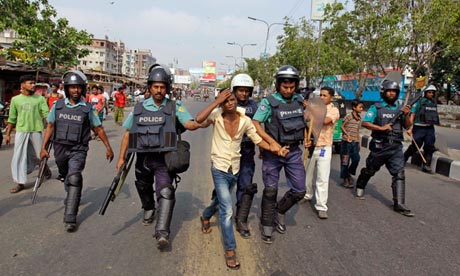
An alliance of opposition parties in Bangladesh has called for a 36-hour general shutdown, or hartal in protest at the continued detention of seven senior officials of the Bangladesh Nationalist party (BNP).
The protest, due to start on Tuesday, is the latest in a series in the increasingly politically volatile south Asian state. All businesses and shops will be expected to close.
Though intensive strikes, demonstrations and clashes in the capital Dhaka and elsewhere in the country have diminished in recent weeks, tensions remain high.
The seven BNP officials were detained in April on charges of inciting violence and vandalism in the country during the unrest earlier this year. Supporters say the charges are trumped up.
Much of the unrest in recent months in the poor but developing country was initially provoked by the first verdicts passed by the new international war crimes tribunal, set up by Sheikh Hasina, the prime minister and daughter of the wartime leader Sheikh Mujibur Rahman, to investigate atrocities committed during the 1971 conflict.
The tribunal is deeply controversial as those who are largely targeted belong to Jamaat-e-Islami, an Islamist party which is a key ally of the BNP. The leader of the opposition BNP, Khaleda Zia, the widow of the independence war’s best-known military commander, has accused Hasina of using the tribunal to hound political enemies.
However, BNP activists say their concern is not with the tribunal itself but with constitutional changes implemented by the current government which will allow it to hold on to power until coming elections later this year or early in 2014, rather than hand over first to a caretaker administration.
“The government is trying to weaken the party by arresting its leaders and activists,” said Khandaker Mosharraf Hossain, a standing committee member of the BNP. “Our movements and protests will not submit to such threats. The country is moving towards a massive unrest. We want the election to be held under a neutral government.”
Three prisoners arrested at the same time as the seven still detained are scheduled to be freed on bail on Monday. They face similar charges and include Moudud Ahmed, a 73-year-old former prime minister and lawyer, who needs medical treatment.
Hasna Moudud, his wife, told the Guardian that she was still concerned. “He has not been released yet. There are still charges against him. We cannot be sure that he will be freed until he is actually released. I am very worried about him and I am very worried about democracy in Bangladesh,” she said.
Bangladesh’s home affairs minister, MK Alamgir, said the opposition activists who had been charged had “incited the people, led the people to commit arsons, set fire on public vehicles and derail the trains.”
“Charges have been presented before the court. It is for the court to decide whether he [Moudud Ahmed] is guilty or not. Prima facie he is guilty, that is why he is being prosecuted,” he told the Guardian.
Instability is likely to worsen as the polls approach, many fear. “The two major political parties and their alliances are strongly opposed to each other. They have very strong positions that they don’t want to compromise,” said Iftekhar Uz-Zaman, executive director of the Bangladesh chapter of the Berlin-based anti-corruption campaign group, Transparency International.
The current administration has already been criticised for detaining four bloggers and the acting editor of Amar Desh, a pro-opposition newspaper. The repeated countrywide shutdowns worry local businessmen, especially those working in the massive garment manufacturing sector. The emergence of a youthful progressive movement named after the Shahbag Square in the centre of Dhaka where most of its protests have been held and of a radical conservative Muslim party called Hefazat-e-Islam have added fuel to the political turmoil in Bangladesh.
Zia, leader of the BNP, has been charged with encouraging and exploiting the rightwing anger to undermine the current government.
The economy has been hit by more than two weeks of shutdowns imposed by various political groups in March alone.
“Hartal is a basic political right but it’s very unfortunate that “the two major political parties try to [make] political mileage by inciting violence,” said Uz-Zaman. Analysts fear that political stability will deteriorate further without some degree of consensus over the holding of the next election between the two mainstream parties.









